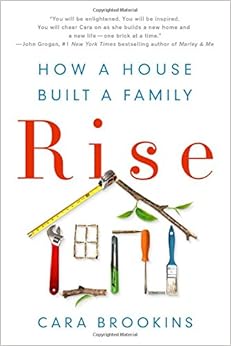
Title: Rise: How a House Built a Family
Author: Cara Brookins
Publication Date: January 2017
Number of Pages: 320
Geographic Setting: Arkansas, USA.
Time Period: Present day
Subject Headings: American Authors, 21st Century, Women Authors, Biography, Divorced mothers, House Construction
Book Summary: After escaping an abusive marriage, Cara Brookins had four children to provide for and no one to turn to but herself. In desperate need of a home but without the means to buy one, she did something unbelievable. Equipped only with YouTube instructional videos, a small bank loan, a mile-wide stubborn streak, Cara built her own house from the foundation up with a work crew made up of her four children. Through building a house together, Cara and her family could finally move on.
1. Where is the book on the narrative continuum?
Highly narrative (reads like fiction)
2. What is the subject of the book? This book is about overcoming a terrible situation by completing a task that is near impossible. It's about a family growing stronger after getting away from abusive husbands through building a house together.
3. What type of book is it? This is a memoir in narrative form.
4. Articulate appeal
- What is the pacing of the book? It's a leisure pace and Brookins does a good job spacing out the good things with the tough challenges she faced so the reader doesn't get bogged down with depressing things.
- Describe the characters of the book. This book is about the author, Cara and her four children as they build a house from the ground up. Cara is a computer programmer and aspiring writer who is trying to pick up the pieces after three failed marriages.
- How does the story feel? Inspiring, shocking, thoughtful.
- What is the intent of the author? To tell her story about how building a house strengthened her relationship with her kids and moving past the bad times.
- What is the focus of the story? The focus of the story is on Cara and how she had to navigate through escaping her marriages, keeping her kids safe, and all in all how they went from a broken and scared family to one that has learned to be free and have fun together.
- Does the language matter? Yes. Cara uses it pretty cleverly to distinguish chapters from building the house to flashbacks from her marriages. chapters labeled "Rise" are about the house, and chapters labeled "Fall" are flashbacks.
- Is the setting important and well described? The setting is important because it led to Cara making the decision to build a house despite all odds as well as the description of how they built it and the work that needed to be accomplished is needed for the reader to grasp how daunting this task is for a mother and four children (one child being only two years old, so really it was a house building crew of four, not five).
- Are there details and, if so, of what? Lots of details about the construction work, and detailed descriptions of her husbands and the expressions on her kid's faces.
- Are there sufficient charts and other graphic materials? Are they useful and clear? None. None needed.
- Does the book stress moments of learning, understanding or experience? Absolutely. They made many mistakes especially in the early stages of building the house, and Cara reflects a lot about why she stayed with certain husbands for so long, what held her back etc.
5. Why would a reader enjoy this book?
1. The experience (how does one go about building a house without any experience!?) 2. Details 3. Conversational tone
Shelby, thank you for sharing this fascinating book. I definitely want to read it. I can't even imagine knowing how to begin building a house. It sounds like a really intriguing device that the author used to label the chapters with "Rise" and "Fall". I would think that it would be an effective means of keeping track of where she was in the story.
ReplyDeleteShelby, I'm so glad you picked this book. Now I have the necessary information to suggest it to patrons. Thanks!
ReplyDeleteGreat prompt response! You do a great job writing informative and concise answers. Full points!
ReplyDelete